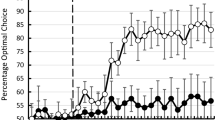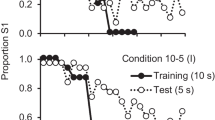Abstract
Pigeons were trained to acquire a new 4-response sequence in each session by pecking three keys in a predetermined order. The key color varied for each step under the chained schedule, but there was only one key color under the tandem schedule. Under the reset contingency, incorrect responses produced a reset of the 4-response sequence to its beginning and a short timeout. In the non-resent contingency, only the timeout was produced by incorrect responses. Under both contingencies of both schedules, low doses (3–10 mg/kg) of pentobarbital increased the response rate and the total number of errors, although the rate increases usually occurred at lower doses than did the increases in errors. A dose of 17.5 mg/kg pentobarbital eliminated almost all responding. Injection of low doses (0.1–0.3 mg/kg) of d-amphetamine decreased the total number of errors under both contingencies of both the chained and the tandem schedules. Higher doses of d-amphetamine sometimes increased the total number of errors and decreased the response rate.
Similar content being viewed by others
References
Ferster, C. B., Skinner, B. F.: Schedules of reinforcement. New York: Appleton-Century-Crofts 1957
Harting, J., McMillan, D. E.: Repeated acquisition of response sequences by pigeons under chained and tandem schedules with reset and non-reset contingencies. Psychol. Rec. (in press)
Laties, V. G., Weiss, B.: Influence of drugs on behavior controlled by internal and external stimuli. J. Pharmacol. exp. Ther. 152, 388–396 (1966)
Thompson, D. M.: Repeated acquisition as a behavioral baseline for studying drug effects. J. Pharmacol. exp. Ther. 184, 506–514 (1973)
Thompson, D. M.: Repeated acquisition of response sequences: Effects of d-amphetamine and chlorpromazine. Pharmacol. Biochem. Behav. 2, 714–746 (1974a)
Thompson, D. M.: Repeated acquisition of behavioral chains under chronic drug conditions. J. Pharmacol. exp. Ther. 188, 700–713 (1974b)
Thompson, D. M.: Repeated acquisition of response sequences: stimulus control and drugs. J. exp. Anal. Behav. 23, 429–436 (1975)
Author information
Authors and Affiliations
Rights and permissions
About this article
Cite this article
Harting, J., Mcmillan, D.E. Effects of pentobarbital and d-amphetamine on the repeated acquisition of response sequences by pigeons. Psychopharmacology 49, 245–248 (1976). https://doi.org/10.1007/BF00426823
Received:
Issue Date:
DOI: https://doi.org/10.1007/BF00426823




